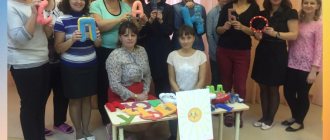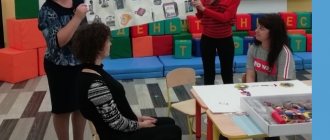Areas of joint activity
- establishing partnerships and creating an atmosphere of mutual support;
- formation of a motivated attitude of parents towards correctional activities;
- selection and implementation of various variable forms of interaction;
- increasing the psychological and pedagogical competence of parents in matters of child speech development;
- providing practical assistance to parents, supporting their confidence in their own pedagogical capabilities;
- training parents in specific speech therapy techniques
Stages and forms of interaction
Over the years of cooperation with the child’s family, I have developed a system of work that can be divided into four blocks, each of which contains its own forms of interaction between the speech therapist and parents:
- Diagnostics;
- Consulting;
- Prevention;
- Education;
We will now talk to you about each of these blocks separately.
Diagnostics
At the beginning of the school year, I examine children's speech. A speech therapy examination is based on general principles and methods of pedagogical study: it must be comprehensive and holistic. I begin the speech therapy examination by studying medical and pedagogical documentation and information about the child’s parents.
I meet families of children who need speech therapy help. I am conducting a survey in order to identify the problems and difficulties of a modern family, as well as to maximize the use of its educational potential and the positive experience of family education.
When planning a forecast for correctional work, I take into account:
- the role of all family members in raising a child.
- type of family upbringing.
From questionnaires and initial conversations, I find out the conditions for raising a child in a family, the child’s characteristics, hobbies, interests. I am interested in the complaints and concerns of parents, their opinions and wishes regarding the development of the child’s speech. This meeting is very important for both sides. Further cooperation depends on its atmosphere. At the very beginning, I try to involve parents in joint work, explain what kind of help I expect from them in education and training, in order to achieve success in speech therapy work.
Consulting
Providing assistance to parents during a specially organized conversation aimed at understanding the essence of the problem and ways to solve it.
Here, the theoretical training of a speech therapist is very important, who can give a clear answer to any question about speech impairment and its correction in a particular child. The competence of a specialist, of course, increases confidence.
Equally important is the parent’s awareness of the speech therapist as a specialist and the areas of his work. This is facilitated by mobile folders with articles about various speech disorders, health activities recommended for children with speech disorders and, of course, a schedule of speech therapist consultations.
If we talk about the information that is conveyed during the consultation, it is perceived better by parents if it is concise and lacks unclear terms. But the parent himself makes the choice whether to come for a consultation or not. If a parent comes for a consultation, it means that he is ready to listen to a specialist, he is motivated.
Prevention
Carrying out a set of activities with the participation of the family aimed at preventing possible disorders in the child
Education
At this stage, I familiarize parents with the age characteristics of children and the conditions that ensure full development. To do this: I organize exhibitions of books, methodological developments, the study of which could help the child’s family become more informed and enlightened about this problem, I develop booklets. I show parents fragments of classes with children, and invite them to open individual lessons so that each parent becomes familiar with the techniques and content of speech therapy work.
Another effective form of education, which I have been actively using in my work lately. This is the use of information and communication technologies. These include media aids (educational and teaching aids, videos, computer presentations); Internet sites of both a kindergarten and a personal site.
Each of the above-described forms of interaction with parents brings “fruit” in its own way in the work of a speech therapist teacher. And the most important result is the achievements and success of each child.
System of interaction between speech therapist and parents in kindergarten
Parsegova Tatyana Viktorovna
System of interaction between speech therapist and parents in kindergarten
Currently, the interaction of a teacher -speech therapist with families of children with speech disabilities is the most relevant. The modern concept of preschool education marked the beginning of the reform of preschool education, which indicates that the family and preschool educational institutions, having their own special functions, cannot replace each other.
The Law of the Russian Federation “On Education” states that one of the main tasks facing a kindergarten is interaction with the family to ensure family education of children with speech impairments. Modern changes in system are also reflected in the content of correctional and developmental education for children with speech disorders.
Undoubtedly, every parent dreams of his child growing up healthy and successful, being able to achieve more than himself, learning to better understand people and interact with them . But few people thought about how important a role a child’s ability to speak correctly and beautifully plays in all this. Speech is one of the most powerful factors and stimuli for development in general. We can say that a person’s speech is his calling card.
The relevance of the problem of family education of children with speech development disorders is determined by successful work with families of pupils of a preschool educational institution. The effectiveness of the preschool institution itself, its interaction with the family , which forces us to look for new forms of this work, depends on what this work will be like.
The effectiveness of the pedagogical activity therapist teacher in working with preschool children with speech disorders will be fully represented if one of the most difficult problems is solved - eliminating the differences in the positions of teachers and parents on issues of children's speech development. Parents often spontaneously withdraw from the work of correcting speech defects in children, since they do not possess the necessary pedagogical knowledge and skills. As a rule, they experience difficulties because they cannot find free time to study with their child at home and do not know how to study.
In addition, a certain part of teachers underestimates the importance of the life activity of preschool children in the family, and finds it difficult to implement this significant factor in correctional work. The lack of systematic feedback from the family deprives teachers of the opportunity to be sufficiently informed about the nature of children’s speech activity in everyday life situations.
The conscious inclusion of parents in the correctional process together with the speech therapist teacher can significantly increase the efficiency of work. Creating a unified space for a child’s speech development is impossible if the efforts of the speech therapist and parents are carried out independently of each other and both parties remain in the dark about their plans and intentions.
The success of correctional education is largely determined by how clearly the continuity of work between the speech therapist and parents . They should become employees, colleagues, assistants to each other, solving common problems.
Tasks of a speech therapist’s work in interacting with parents :
Establish partnerships with the family of each student;
Join efforts for the development and education of children;
Create an atmosphere of mutual understanding , community of interests, emotional mutual support ;
Activate and enrich the educational skills of parents , maintain their confidence in their own teaching capabilities.
The tasks of parents in correctional work with their children:
Creating conditions in the family that are favorable for the general and speech development of children;
Carrying out targeted and systematic work on the general speech development of children and the need to correct deficiencies in this development according to the recommendations of specialists.
To effectively solve these problems, the speech therapist teacher needs to know each family better, taking into account :
all family members in raising a child;
type of family upbringing;
the position taken by parents in relation to the child.
Parents have different demands on the child; some children experience a lack of communication with their parents , because most of the time children are in the care of grandmothers or older brothers and sisters.
The most typical mistakes parents in the process of developing and raising their children are:
excessively negative assessment of the child’s activities;
the spread of a negative assessment of aspects of the child’s activities to his entire personality, which can lead to the formation of an inferiority complex;
negative emotional connotation of statements (sharp shouting, threatening intonation)
;
contrasting the child, his affairs and actions with his peers, especially with healthy children;
sharp transitions from parental only positive assessments to negative ones, from their punishing tone to affectionate cajoling.
If parents try to independently develop and correct their children’s speech, without the help of specialists, they often encounter the following mistakes:
- adaptation to the child’s incorrect speech;
- repeated repetitions of the same exercises;
— ignorance of special techniques for monitoring and correcting sounds;
- insufficient use of comparison and juxtaposition techniques;
— monotony of classes, conducting them without clarity, game techniques, didactic materials, creating appropriate situations;
- frequent reprimand and correction of speech without taking into account the place, time and emotional state of the child, inability to emphasize his successes, which causes psychological discomfort;
- ignorance of the child’s individual characteristics.
Therefore, it is necessary to carry out educational work, set up and attract the attention of parents to the child’s problem , help them perceive their child correctly, teach them to act together, and make the same demands for the successful correction of speech disorders.
I build my communication with parents on the basis of the principle “ A parent is not a guest , but a full member of the preschool educational institution team,” since I believe that we have one common task - raising a highly moral person. The interaction between the teacher-speech therapist and the family is a necessary condition for the full speech development of preschool children, since the best results are observed where speech therapists and parents act in concert. The concept of “ interaction with the family ” should not be confused with the concept of “working with parents ,” although the second is an integral part of the first. Interaction necessarily implies control, or feedback; At the same time, control should be unobtrusive and indirect.
Experience has shown that families are competent parents who take on reinforcing and supporting functions in working on speech, thereby creating favorable conditions for the development of their child.
All our interaction with colleagues , family, friends, is based on communication. Sometimes what and how we say becomes very important. Convince that you are right, impress the person you like, protect your rights, win your proper position in life - all this can be done with the help of eloquence.
Unfortunately, recently such a phenomenon as speech impairment and slowdown in a child’s speech development is quite common. This, of course, complicates his communication in society and, subsequently, can affect the social adaptation and success of an adult. Therefore, it is very important to pay attention to possible disorders in the baby in this area as early as possible and prevent their development.
The goal of speech therapy work with children in kindergarten is the development of speech, the correction of its phonetic and phonemic deficiencies, and the formation of the ability to use speech as a means of communication for further successful socialization.
Correct speech is the merit not only of the teacher and speech therapist, but also of the parents , those whom the little ones imitate, for whom parents are an example , an example not only at the moment, but for the rest of their lives.
The family is the first social community that lays the foundations for a child’s personal qualities. In the family he acquires initial communication experience. Here he develops a feeling of trust in the world around him, in close people, and on this basis curiosity, inquisitiveness, cognitive and verbal activity and many other personal qualities appear. All this must be taken into account when planning work with your family.
The significance and variety of forms of work between a teacher and a speech therapist with parents cannot be overestimated . The need to use them is important not only for teachers, but, above all, for parents whose children attend preschool. The problem of many modern parents is poor pedagogical knowledge, detachment, the reasons for which are hidden, first of all, in the lack of basic psychological and pedagogical knowledge and the reluctance of parents to understand the complex world of the child. Therefore, success in raising and teaching children in a preschool institution largely depends on how the pedagogical education of parents . Working with children with speech underdevelopment includes correctional and educational influence from the preschool institution and parents .
For the education and development of these children, I define a modern conceptual approach, strive to search for variable developments, using new approaches to teaching, and carefully select forms and methods aimed at correcting speech disorders.
In my correctional work I use the following theoretical approaches:
personality-oriented and competence-based approaches, involving analysis and generalization, the development of methodological conditions for studying the needs of a modern family, the formation of parental competence ;
a spheral approach, which involves studying the state of interaction between the teacher and the families of pupils, and the introduction of such forms of cooperation that make it possible to harmonize pedagogical guidelines for the development, upbringing and education of children;
a differentiated approach aimed at developing an individual correctional and educational route for a child together with parents .
Main areas of activity (diagram 1)
•Analytical.
Study of the family of a child with a complex structure of a defect, questioning.
•Planning and organizational.
Planning and organizing work with parents to overcome the structure of children's defects.
•Methodological.
Development of methodological support for a system of working with parents to correct ODD in preschool children within the framework of full-time and correspondence work.
My MOTTO in working with parents : WE ARE READY TO WORK TOGETHER WITH YOU, BUT NOT INSTEAD OF YOU!
Success in raising and educating children largely depends on how the pedagogical education of parents and how diverse and interesting the forms of interaction .
I will name the main forms of interaction with families :
Parent meetings.
Here the foundations of cooperation and interaction , friendships and partnerships are formed, opinions are exchanged, and problems that arise in the process of raising and developing a child are resolved. I conduct these meetings in the form of a classic meeting (providing information to parents , questions from parents , answers from the teacher, in the form of trainings, conferences, role-playing games.
Regardless of the type of meeting, I adhere to the “10 golden rules”
:
The meeting should be memorable.
It should make you think.
Set parents up in a positive , constructive manner.
The information block must be well prepared.
In the presence of other parents, you should praise children , noting their achievements; you should criticize a child only in a conversation alone with a parent .
for each parent .
A meeting is not a lecture, not a lesson; involve parents in dialogue .
Respect your time and the time of your parents - the meeting should not last more than 1 hour 20 minutes: 20 minutes for new information, 15-20 minutes to listen to questions and answer them, 20 minutes for individual questions.
Each meeting should contain a brief report about the most interesting activities of the group and the achievements of the children. Announce future events, invite parents to cooperate .
Be creative—conduct each meeting differently.
Most of the information, according to psychologists, we remember by perceiving it visually. Therefore, I use visual forms; they are very important for working with parents and stimulating their activity. Visibility is ensured by the use of a variety of accompanying illustrations, demonstration of practical work, and exhibition material.
At the first group parent meeting, I explain parents that adult family members are responsible for creating the child’s motivation to study at home, conducting classes with the child in various forms outside kindergarten , taking additional measures in the presence of disorders accompanying the main defect (consultation with a neurologist, psychoneurologist, orthodontist)
.
I emphasize the importance of systematic work with the child . also receive information on how to study at home and how to keep individual notebooks.
Questionnaire
Questioning involves a strictly fixed order, content and form of questions, and a clear indication of answer methods. Using a questionnaire, I find out the composition of the family, the characteristics of family upbringing, the positive experiences of parents , their difficulties, and mistakes. By answering the questionnaire, parents begin to think about the problems of upbringing, about the peculiarities of raising a child. An important question is aimed at identifying the needs of parents in pedagogical knowledge. For example, “on what issues in your child’s education would you like to receive a speech therapist’s recommendation.” I begin the questionnaire with an introduction, which indicates who is conducting the survey and why. Do not write: “we are interested in this and that,” since such a phrase may cause hostility. It is better to emphasize the active position of the respondent himself, for example, “Your opinions will help improve the work” or “They will allow you . ” The following are instructions for implementation. I conduct a survey of parents at the beginning of the school year; with the help of questionnaires, I find out information about children that helps them adapt, as well as more successful interaction with them .
The content of the questionnaires is changed and supplemented annually. Constant awareness of the level of satisfaction of parents allows us to build work with each family in its own direction.
Workshops.
Adults who cannot work with children at home due to a lack of skills in organizing the child’s behavior or low pedagogical literacy come to watch individual speech therapy sessions. The main attention of parents is drawn to the need to combine speech exercises with tasks for the development of mental processes. Adults learn practical techniques for working with children.
“ Parent + child ” to provide parents with joint forms of activities with children that are correctional in nature, while solving the problems of an individual program of work with the family. A prerequisite is the presence of parents , especially mothers, at them: “We learn from those we love.” The parent gradually masters purely speech therapy skills and abilities; a good parent inevitably becomes “a bit of a family speech therapist.” By observing the work of a speech therapist, parents are more willing and better able to complete homework with their child, and the process speeds up twice as much.
Joint learning by mother and child of articulation gymnastics techniques, finger games, etc. Slide
Information booklets contain brief information material on the correction of speech disorders
Sound pronunciation screen – shows the number of impaired sounds in children and the dynamics of sound pronunciation correction. Parents see how the sound correction process is progressing (this is indicated by colored symbols)
. They can clearly see which sounds are still being automated and which ones have been introduced into speech. Slide
Open days.
Open days are held once a year to familiarize parents with the organization of correctional and educational work with children in kindergarten , the successes and problems of the child, and the features of working with him.
Holidays and entertainment.
During the school year, various entertainment events are held parents I take an active part in them, children and parents hear correct speech and appropriate intonation not only in classes, but also in leisure hours. Slide
Notebooks on sound automation.
main form of interaction with parents is a homework notebook. It serves as a “helpline” for us - an adult can write in it any question or doubt regarding the quality of the child’s assignments. Depending on the severity of the speech disorder, I give tasks in the notebook not only on sound pronunciation, but also on the formation of vocabulary, grammatical skills and skills for the development of attention and memory. Allows you to automate sounds at home and introduce them into speech.
Parental five-minute meetings are a short-term personal consultation.
I introduce parents to interesting games for the development of logical thinking and speech.
Consulting on requests
Includes: a statement of the dynamics of speech development (what he has coped with, what else causes difficulties, exchange of impressions and observations of the child’s speech, individual workshops, adjustments to the plan of joint activities on speech development, recommendations and tasks for the child’s parents , setting an approximate date for the next meeting.
Home library of author's manuals
I successfully use it as a methodological and visual material for individual lessons between parents and children according to my instructions. A detailed description of all concepts, terms, tasks and exercises allows an adult without special training to successfully engage in correctional and developmental activities. Photo
Mass media
I offer material not only for parents of preschool educational institutions , but also bring information material to the general public on working with children with speech pathology.
Corner for parents
In addition to its main task (informing the parent about the organization of the educational process, documents, announcements, announcements of seminars and other events, etc.) it also solves other problems. Here a parent can read an article from the series “In the speech therapist’s office” (which is periodically updated), how to study at home on a lexical topic, etc.
Sliding folders
They contain material with developed sets of games, exercises, as well as reinforcement material for children’s knowledge on lexical topics for practical use with children at home.
Each of the above forms “fruit” in its own way.
in my job.
And the most important “fruit”
is the achievements and successes of children,
mutual understanding with parents and the joy of communicating with them. Of course, not all parents immediately make contact with us, but I try to work so that they understand: teachers want to help their children overcome difficulties, so it is necessary to strive for mutual understanding and cooperation .
This is the only way we can achieve positive results. Improving the pedagogical culture of parents is the basis for improving the full development of the child. The involvement of parents in the educational process, their interested participation in correctional pedagogical activities is important not because I want it, but because it is necessary for the development of their own child.




